And he described - in his speech to an episode of “Beyond the News” program (10/12/2021) - the measures taken by Saeed as a legal absurdity and a confusion of concepts, and that they set Tunisia back decades, stressing that the president does not have the right to prejudice or amend the constitutional texts. Because it is she who determines his powers and tasks that must be implemented, and measuring the will of the people is not through guesswork, but through the ballot boxes.
He added that "returning to the people" must take place today through early elections to resolve the conflict today. In light of the results of the elections, there is talk about whether or not to amend the 2014 constitution, indicating that there is a state of extreme restlessness in the Tunisian street about the president's speeches that are not followed by action.
Ben Mubarak stressed that the Tunisian army began to feel the seriousness of the situation in the country due to the president's actions, which explains why he delivered a conciliatory speech with everyone to reassure the military establishment and the outside community.
Tunisian President Kais Saied said that the 2014 constitution lacks legitimacy, and that the solution is to return to the people differently.
He added - in subsequent statements - that Tunisia will not progress unless in light of acceptance of the other and fair competition.
For its part, the Democratic Initiative in Tunisia warned the president against violating the constitution, and the Democratic Current revealed consultations to form a front against him.
On the other hand, former member of the National Constituent Assembly, Rabeh Al-Kharaifi, said that Tunisian President Kais Saied's decision came based on the disruption of the work of many articles of the current constitution, due to what he called the weakness of the House of Representatives.
He added that the amendments that Saeed seeks to introduce to the current constitution relate to the legislative and executive powers, and came 10 years after the constitution was approved, and they will not be imposed, but will be approved through a popular referendum, as happened in the previous constitution.
He added that the president's legitimacy derives from the ballot boxes, not from the parliament, whose work was suspended after it turned into a wrestling arena, pointing out that the president spoke in a serious conciliatory language to give Tunisians a glimmer of hope that the decisions taken on July 25 are going right.

